love this chart. It's too late for 1.5, but the fight for 2C is very much still alive
01.10.2025 08:50 — 👍 2 🔁 0 💬 0 📌 0Ali Duffey
@aliduffey.bsky.social
Climate science, solar geoengineering, arctic change PhD student at University College London
@aliduffey.bsky.social
Climate science, solar geoengineering, arctic change PhD student at University College London
love this chart. It's too late for 1.5, but the fight for 2C is very much still alive
01.10.2025 08:50 — 👍 2 🔁 0 💬 0 📌 0wrote about this last year and sure I wasn't in any way the only one but imo people voting for populist politics in the 21st century *is* a sign that they do just have too much faith in institutions, as opposed to not enough - they want to have their little tantrum but assume things will just hold
19.09.2025 20:23 — 👍 1423 🔁 259 💬 52 📌 31The evidence we have, though, suggests SAI is not like these other ideas, being instead logistically feasible, effective and quite cheap.
We could be wrong on all three of these, of course, but honest debate about geoengineering demands that we grapple with that evidence
The SAI section bends over backwards to try to fit it into the same mould as the others (logistically difficult, expensive, and ineffective), but in doing so makes some surprising errors as well as being one-sided.
09.09.2025 13:27 — 👍 0 🔁 0 💬 1 📌 0But the idea that further research into these is a waste of resources is crazy to me, when i think about what is at stake here.
Yes sea-curtains sound difficult, but so does building a sea-wall around Bangladesh.
Similarly for the ice sheet interventions. While those working on these have been the first to ackowledge that they are profoundly ambitious ideas, the Siegert et al study is a valuable and welcome critical perspective to help understand how and why these ideas would face challenges.
09.09.2025 13:27 — 👍 1 🔁 0 💬 1 📌 0My impression is that sea-ice thickening and the ice sheet interventions are somewhere between implausible and just unlikely. The potential for sea-ice thickening to meaningfully impact global climate is often exaggerated, though, and its good to call this out
09.09.2025 13:27 — 👍 0 🔁 0 💬 1 📌 0
Glass beads for sea-ice albedo modification has always been an implausible idea - here's me in 2023 writing as much. I welcomed the decision of the Arctic Ice project folks to wind down their activities.
www.arcticiceproject.org/the-project/
agupubs.onlinelibrary.wiley.com/doi/full/10....
Not all geoengineering proposals are plausible, and we shouldn't waste time and resources on the implausible ones.
Siegert et al look at 5 (really, 6): sea-ice thickening, sea-ice albedo modification, sea-bed curtains, basal water removal from ice sheets, CDR via ocean fertilization, and SAI
Is this a crisis or not? Are tipping point risks serious or not?
Net zero is non-negotiable, but climate impacts are here, and all plausible emissions scenarios see us pass 1.5C.
If now is not a reasonable time to explore radical ideas, when would be?
One of the all-time great test matches. One of the all-time great series.
Topsy-turvy, up and down and, in the end, perfectly balanced. Can't say fairer than that.

The Guardian will publish scary headlines about ice sheet and AMOC collapse on a Friday, then stuff like this on a Monday: www.theguardian.com/commentisfre...
How are people supposed to navigate this? Is climate change an urgent problem, or not?
"some experts are sceptical"..
New Scientist has been poor on distinguishing serious and unserious climate intervention ideas recently. There isn't even a peer-reviewed paper making the case for this yet!
Yeah, the conspiracy theories are growing in a very scary way
12.07.2025 11:52 — 👍 2 🔁 0 💬 0 📌 0A very good if somewhat strange watch.
not very informative on risk-reward tradeoffs for solar geo though
@eaterofsun.bsky.social might be of interest
11.07.2025 10:31 — 👍 1 🔁 0 💬 0 📌 0..and is why a framing of SRM as an "in case of emergency break-glass" type intervention can be misleading
11.07.2025 10:21 — 👍 1 🔁 1 💬 0 📌 0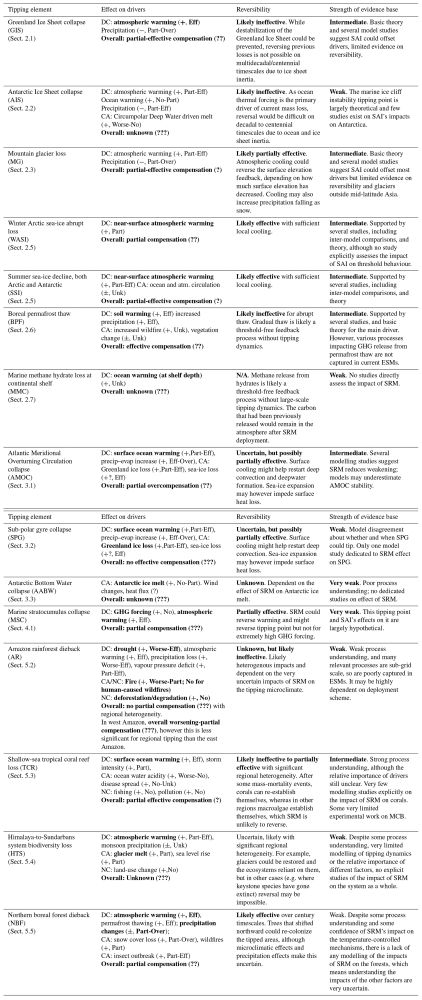
A long table summarising the main findings of the paper
BUT, once things are already tipped, SRM might not be able to get you back - we assessed "reversibiility" as ineffective or only partially effective for many important systems.
This shouldn't be surprising - this behaviour is part of what makes these things "tipping points"
the slight less TLDR version is that SRM likely reduce the strength of driving factors for tipping in a range of systems, generally by reducing temperature but in some cases by restoring other climatic drivers too
11.07.2025 10:21 — 👍 1 🔁 1 💬 1 📌 0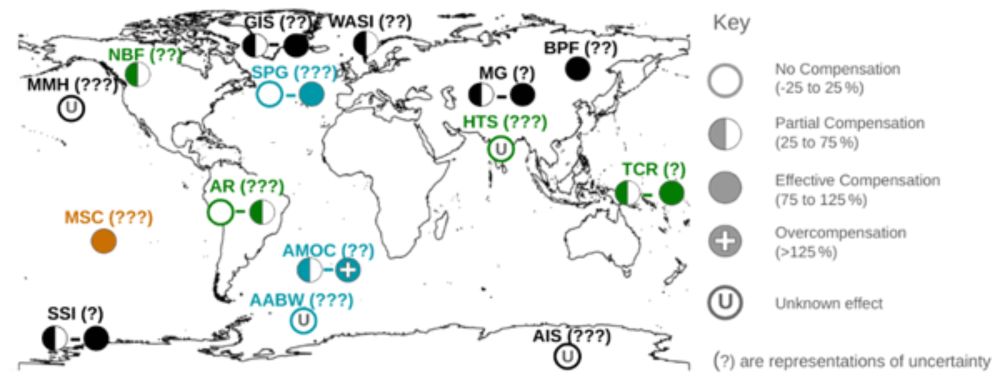
here's the paper
esd.copernicus.org/articles/16/...
Given this context, I'm delighted to share a new review on the solar geoengineering and earth system tipping points. Its a long read including ice sheets, AMOC, coral reefs, Amazon dieback and various others..
TLDR: solar geo probably helps avoid tipping, but a lot more research is needed
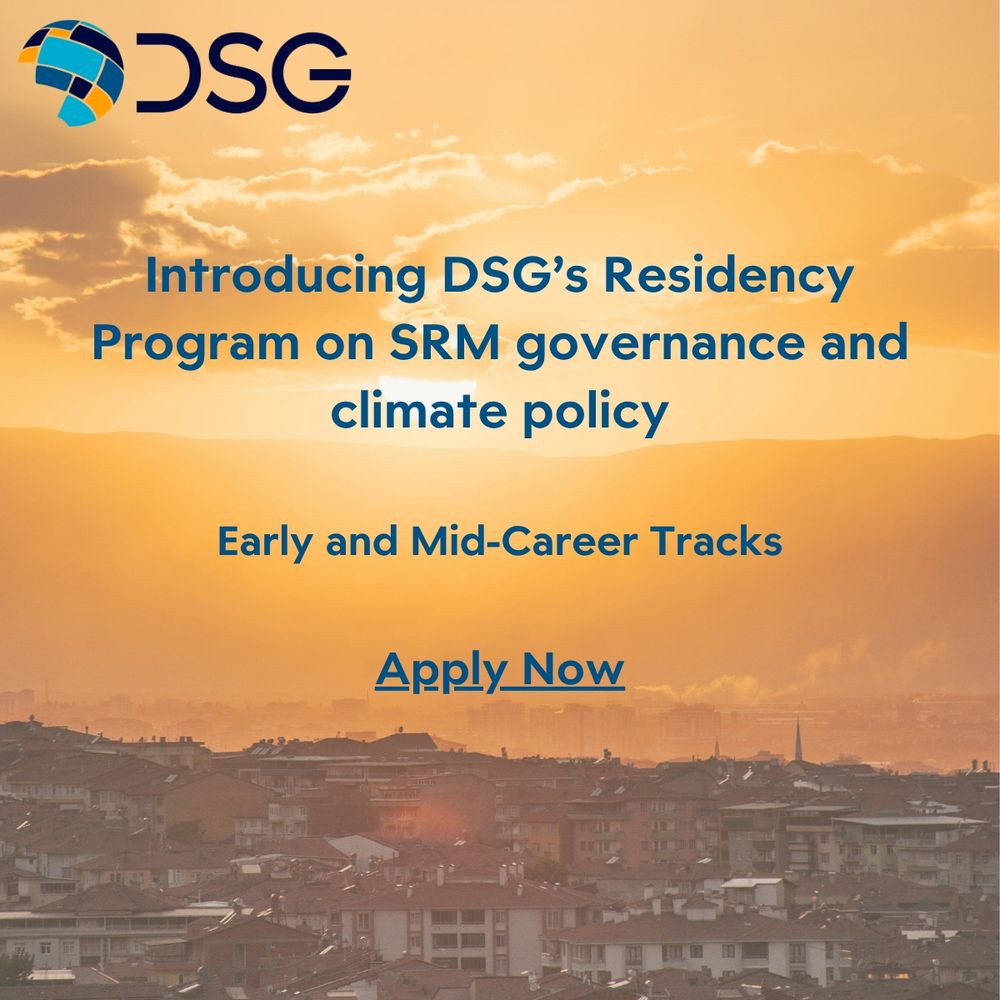

New opportunity: Become a DSG Fellow and contribute to building critical expertise on solar geoengineering governance. Early- or mid-career and working in climate science, policy, ethics, law, or humanities with an interest in SRM? Apply now: www.sgdeliberation.org/our-work/res...
07.07.2025 15:17 — 👍 3 🔁 4 💬 0 📌 0The intro to this paper of mine last year has some potentially useful refs on the hydrological response to SRM, particularly on seperating the fast and slow responses to CO2
iopscience.iop.org/article/10.1...
This may all be somewhat tangential to your argument though..
My thinking was that G1 has unchanged global mean temp, but a different spatial pattern (cooler tropics, warmer poles, amongst other things), as well as the extra GHGs and less sunlight.
Kravitz 2015 describes the CMIP6-era GeoMIP experiments gmd.copernicus.org/articles/8/3...
...
Awesome! The G1 GeoMIP experiment might be a nice additional test case?
Also, small typo on line 86 (two 'η_uniform's)
And remember that the peak temperatures you experience in SE England in the next couple of days will be 4-5°C warmer than they would have been with similar weather patterns in the climate of a century ago.
29.06.2025 17:53 — 👍 62 🔁 7 💬 0 📌 0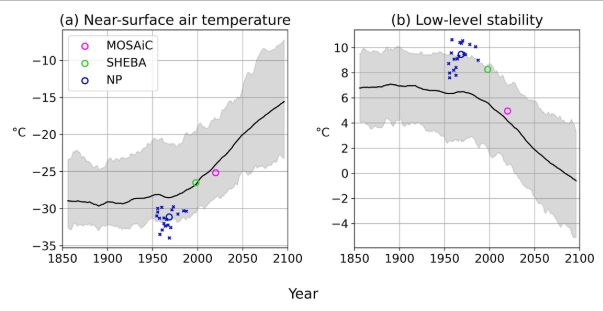
The scariest plot in the paper is this one. The Arctic is rapidly heading towards a qualitatively different winter atmospheric state, in which strong stability near the surface no longer dominates.
09.06.2025 14:23 — 👍 3 🔁 1 💬 0 📌 0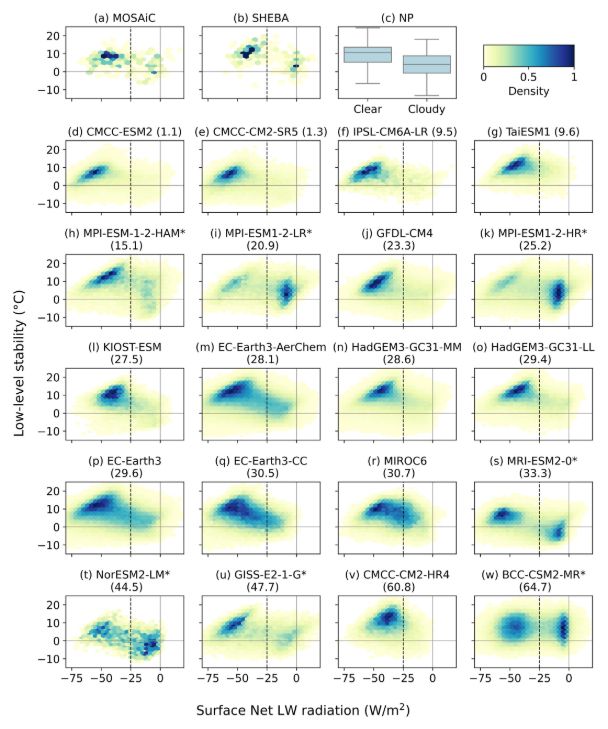
Also take a look if you are an enthusiast for large numbers of subplots, i think the (w) here is my record.
09.06.2025 14:23 — 👍 2 🔁 0 💬 1 📌 0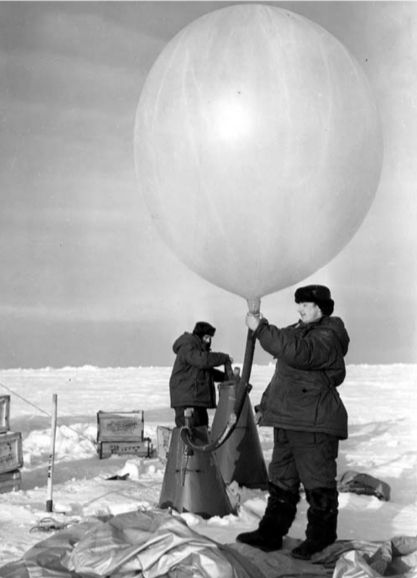
This is Vasily Kanaki (left) and Igor Tsigelnitsky preparing a radiosonde at "North Pole 3" station in 1954. One of 1000s of radiosondes that contributed atmospheric profiles to our analysis.
09.06.2025 14:23 — 👍 0 🔁 0 💬 1 📌 0